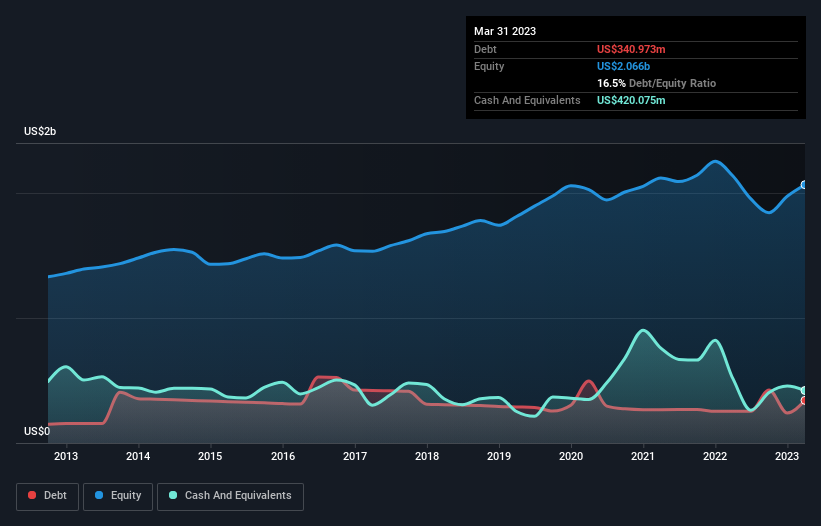- United States
- /
- Construction
- /
- NYSE:EME
These 4 Measures Indicate That EMCOR Group (NYSE:EME) Is Using Debt Safely

Legendary fund manager Li Lu (who Charlie Munger backed) once said, 'The biggest investment risk is not the volatility of prices, but whether you will suffer a permanent loss of capital.' So it might be obvious that you need to consider debt, when you think about how risky any given stock is, because too much debt can sink a company. As with many other companies EMCOR Group, Inc. (NYSE:EME) makes use of debt. But should shareholders be worried about its use of debt?
Why Does Debt Bring Risk?
Generally speaking, debt only becomes a real problem when a company can't easily pay it off, either by raising capital or with its own cash flow. Part and parcel of capitalism is the process of 'creative destruction' where failed businesses are mercilessly liquidated by their bankers. While that is not too common, we often do see indebted companies permanently diluting shareholders because lenders force them to raise capital at a distressed price. Of course, the upside of debt is that it often represents cheap capital, especially when it replaces dilution in a company with the ability to reinvest at high rates of return. When we examine debt levels, we first consider both cash and debt levels, together.
See our latest analysis for EMCOR Group
What Is EMCOR Group's Net Debt?
As you can see below, at the end of March 2023, EMCOR Group had US$341.0m of debt, up from US$253.9m a year ago. Click the image for more detail. But it also has US$420.1m in cash to offset that, meaning it has US$79.1m net cash.

How Healthy Is EMCOR Group's Balance Sheet?
According to the last reported balance sheet, EMCOR Group had liabilities of US$2.66b due within 12 months, and liabilities of US$913.2m due beyond 12 months. Offsetting this, it had US$420.1m in cash and US$2.99b in receivables that were due within 12 months. So its liabilities total US$166.1m more than the combination of its cash and short-term receivables.
This state of affairs indicates that EMCOR Group's balance sheet looks quite solid, as its total liabilities are just about equal to its liquid assets. So while it's hard to imagine that the US$8.79b company is struggling for cash, we still think it's worth monitoring its balance sheet. Despite its noteworthy liabilities, EMCOR Group boasts net cash, so it's fair to say it does not have a heavy debt load!
Also positive, EMCOR Group grew its EBIT by 20% in the last year, and that should make it easier to pay down debt, going forward. The balance sheet is clearly the area to focus on when you are analysing debt. But it is future earnings, more than anything, that will determine EMCOR Group's ability to maintain a healthy balance sheet going forward. So if you want to see what the professionals think, you might find this free report on analyst profit forecasts to be interesting.
Finally, a company can only pay off debt with cold hard cash, not accounting profits. EMCOR Group may have net cash on the balance sheet, but it is still interesting to look at how well the business converts its earnings before interest and tax (EBIT) to free cash flow, because that will influence both its need for, and its capacity to manage debt. Over the last three years, EMCOR Group recorded free cash flow worth a fulsome 89% of its EBIT, which is stronger than we'd usually expect. That puts it in a very strong position to pay down debt.
Summing Up
While it is always sensible to look at a company's total liabilities, it is very reassuring that EMCOR Group has US$79.1m in net cash. And it impressed us with free cash flow of US$448m, being 89% of its EBIT. So we don't think EMCOR Group's use of debt is risky. There's no doubt that we learn most about debt from the balance sheet. But ultimately, every company can contain risks that exist outside of the balance sheet. For instance, we've identified 1 warning sign for EMCOR Group that you should be aware of.
At the end of the day, it's often better to focus on companies that are free from net debt. You can access our special list of such companies (all with a track record of profit growth). It's free.
Valuation is complex, but we're here to simplify it.
Discover if EMCOR Group might be undervalued or overvalued with our detailed analysis, featuring fair value estimates, potential risks, dividends, insider trades, and its financial condition.
Access Free AnalysisHave feedback on this article? Concerned about the content? Get in touch with us directly. Alternatively, email editorial-team (at) simplywallst.com.
This article by Simply Wall St is general in nature. We provide commentary based on historical data and analyst forecasts only using an unbiased methodology and our articles are not intended to be financial advice. It does not constitute a recommendation to buy or sell any stock, and does not take account of your objectives, or your financial situation. We aim to bring you long-term focused analysis driven by fundamental data. Note that our analysis may not factor in the latest price-sensitive company announcements or qualitative material. Simply Wall St has no position in any stocks mentioned.
About NYSE:EME
EMCOR Group
Provides construction and facilities, building, and industrial services in the United States and the United Kingdom.
Outstanding track record with flawless balance sheet.


